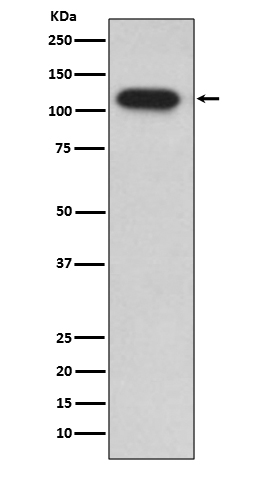IDE Antibody
Rabbit mAb
- 产品详情
- 实验流程
Application
| WB, IHC |
|---|---|
| Primary Accession | P14735 |
| Reactivity | Rat, Human, Mouse |
| Clonality | Monoclonal |
| Other Names | INSULYSIN; Insulin degrading enzyme; IDE; |
| Isotype | Rabbit IgG |
| Host | Rabbit |
| Calculated MW | 117968 Da |
| Dilution | WB 1:500~1:2000 IHC 1:50~1:100 |
|---|---|
| Purification | Affinity-chromatography |
| Immunogen | A synthesized peptide derived from human IDE |
| Description | This gene encodes a zinc metallopeptidase that degrades intracellular insulin, and thereby terminates insulins activity, as well as participating in intercellular peptide signalling by degrading diverse peptides such as glucagon, amylin, bradykinin, and kallidin. The preferential affinity of this enzyme for insulin results in insulin-mediated inhibition of the degradation of other peptides such as beta-amyloid. |
| Storage Condition and Buffer | Rabbit IgG in phosphate buffered saline , pH 7.4, 150mM NaCl, 0.02% sodium azide and 50% glycerol. Store at +4°C short term. Store at -20°C long term. Avoid freeze / thaw cycle. |
| Name | IDE {ECO:0000303|PubMed:20364150, ECO:0000312|HGNC:HGNC:5381} |
|---|---|
| Function | Plays a role in the cellular breakdown of insulin, APP peptides, IAPP peptides, natriuretic peptides, glucagon, bradykinin, kallidin, and other peptides, and thereby plays a role in intercellular peptide signaling (PubMed:10684867, PubMed:17051221, PubMed:17613531, PubMed:18986166, PubMed:19321446, PubMed:21098034, PubMed:2293021, PubMed:23922390, PubMed:24847884, PubMed:26394692, PubMed:26968463, PubMed:29596046). Substrate binding induces important conformation changes, making it possible to bind and degrade larger substrates, such as insulin (PubMed:23922390, PubMed:26394692, PubMed:29596046). Contributes to the regulation of peptide hormone signaling cascades and regulation of blood glucose homeostasis via its role in the degradation of insulin, glucagon and IAPP (By similarity). Plays a role in the degradation and clearance of APP-derived amyloidogenic peptides that are secreted by neurons and microglia (Probable) (PubMed:26394692, PubMed:9830016). Degrades the natriuretic peptides ANP, BNP and CNP, inactivating their ability to raise intracellular cGMP (PubMed:21098034). Also degrades an aberrant frameshifted 40-residue form of NPPA (fsNPPA) which is associated with familial atrial fibrillation in heterozygous patients (PubMed:21098034). Involved in antigen processing. Produces both the N terminus and the C terminus of MAGEA3-derived antigenic peptide (EVDPIGHLY) that is presented to cytotoxic T lymphocytes by MHC class I. |
| Cellular Location | Cytoplasm, cytosol. Cell membrane {ECO:0000250|UniProtKB:P35559}. Secreted Note=Present at the cell surface of neuron cells. The membrane- associated isoform is approximately 5 kDa larger than the known cytosolic isoform |
| Tissue Location | Detected in brain and in cerebrospinal fluid (at protein level). |
Research Areas
For Research Use Only. Not For Use In Diagnostic Procedures.
Application Protocols
Provided below are standard protocols that you may find useful for product applications.
终于等到您。ABCEPTA(百远生物)抗体产品。
点击下方“我要评价 ”按钮提交您的反馈信息,您的反馈和评价是我们最宝贵的财富之一,
我们将在1-3个工作日内处理您的反馈信息。
如有疑问,联系:0512-88856768 tech-china@abcepta.com.
¥ 1,500.00
Cat# AP91040























 癌症的基本特征包括细胞增殖、血管生成、迁移、凋亡逃避机制和细胞永生等。找到癌症发生过程中这些通路的关键标记物和对应的抗体用于检测至关重要。
癌症的基本特征包括细胞增殖、血管生成、迁移、凋亡逃避机制和细胞永生等。找到癌症发生过程中这些通路的关键标记物和对应的抗体用于检测至关重要。 为您推荐一个泛素化位点预测神器——泛素化分析工具,可以为您的蛋白的泛素化位点作出预测和评分。
为您推荐一个泛素化位点预测神器——泛素化分析工具,可以为您的蛋白的泛素化位点作出预测和评分。 细胞自噬受体图形绘图工具为你的蛋白的细胞受体结合位点作出预测和评分,识别结合到自噬通路中的蛋白是非常重要的,便于让我们理解自噬在正常生理、病理过程中的作用,如发育、细胞分化、神经退化性疾病、压力条件下、感染和癌症。
细胞自噬受体图形绘图工具为你的蛋白的细胞受体结合位点作出预测和评分,识别结合到自噬通路中的蛋白是非常重要的,便于让我们理解自噬在正常生理、病理过程中的作用,如发育、细胞分化、神经退化性疾病、压力条件下、感染和癌症。






